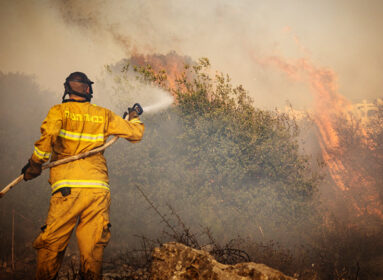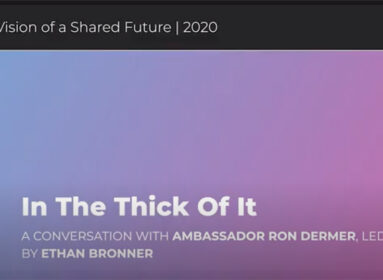 Conversation with Michael Lasser
Conversation with Michael Lasser
By Cindy Mindell
There are a lot of Jewish names in the index of America’s Songs II, a new book on the explosion of popular music written and performed for some 30 years after World War I. While this is a point of pride for many Jews, scholars like to debate the extent to which Jewish songwriters and musicians were influenced by their Jewish backgrounds. After all, the index includes many non-Jewish names as well.
Author Michael Lasser is an expert on the period from 1920 to 1950 that is known as the “Great American Song Book.” A writer, lecturer, and educator, Lasser created and hosts the nationally syndicated public radio program, Fascinatin’ Rhythm, winner of a 1994 Peabody Award.
A major contributor to the standard work, American Song Lyricists, 1920-1960 by Philip Furia (Gale, 2002), Lasser joined Furia to write America’s Songs I: The Stories Behind the Songs of Broadway, Hollywood, and Tin Pan Alley (Routledge, 2006). His follow-up, America’s Songs II: Songs from the 1890’s to the Post-War Years, was published by Routledge late last year.
Lasser’s upcoming book-talks are among several Connecticut events that celebrate the Great American Song Book, and some of its Jewish contributors. Lasser, who is himself Jewish, spoke with the Ledger on how Jews – among others – helped form and perform the unparalleled body of musical work that defined 20th-century American culture.
Q: Why did you write America’s Songs II?
A: There were left-over songs from the first one. When Phil [Furia] and I did the first, we had such a long list of songs that we couldn’t get in because the publisher puts limits on you and you can’t keep going unless you don’t want get your book published. So we ended up not writing about hundreds of songs. I called Phil two years ago and asked if he wanted to do the rest. He said, “I just finished a book and I’m bushed,” but he gave me his blessing and wrote the foreword.
I took the list that we had compiled and took some songs out and put in different ones because when you collaborate, you compromise. I fine-tuned it so that the list was more mine and a year later, it was written.
Q: Where does the term “Great American Song Book” come from?
A: I’m not sure who came up with the term and when, but it refers to the unequalled popular songs written between 1920 and 1950, but anticipated by the arrival of ragtime, jazz, and especially Tin Pan Alley in the preceding two decades.
The period I address in my book is post-World War I. These songwriters are coming of age in the ‘20s and ‘30s and doing their best work in the ‘20s, ‘30s, and ‘40s. Then rock-and-roll sweeps much of that away, temporarily. One of the things that defines the Great American Song Book is that there were more great songwriters working at the height of their power than at any other time.
But the Gershwins, Irving Berlin, and Cole Porter did not consider themselves as contributing to the Great American Song Book because the term hadn’t been coined yet. Between 1900 and 1920, things were happening in music that affected and helped to shape these songwriters. One of them was ragtime, one was the blues, and one was jazz. On one hand, the songwriters are not writing jazz, but on the other hand, they’re being influenced by jazz. They didn’t say, “I was taught by jazz;” they did it intuitively – jazz was in the air and you absorbed it; the syncopation from ragtime was in the air and became part of America’s musical DNA.
Q: Jews like to think that we had a lot of influence on American music during this period – not only as musicians and composers, but as Jews. What do your findings reveal?
A: Jewish performers, like Jewish songwriters, were mainly in the mainstream. People disagree about the influence of Jewish cultural components like klezmer. A book about Jewish songwriters that I quote in my own book claims that their Jewishness is what defined their work and so American popular music is essentially Jewish by extension.
I don’t think he’s right. I think Jewish musicians at the time were eager not to be Jewish. If you walked up to Irving Berlin and asked if he was Jewish, he would say, “Sure I’m Jewish,” but he never went to synagogue, he married non-Jewish women, and he did not practice the religion. But he understood that, by background and identity, he was Jewish, but not in any way a religious Jew. Let’s not forget that he also wrote “White Christmas” and “Easter Parade,” though they are not religious songs.
They wanted to be American and were willing to give up their heritage, their religion, even their names. Being American was more important, but they couldn’t escape their Jewishness even if they wanted to. If they had changed their name to O’Reilly, they still would have inherited some things from their Jewish background and that comes through in their music.
Every group that came to this country brought its music along: the Irish waltz, the Italian aria, the German oom-pa-pa. It’s all there; our music is a second melting pot. The Jews and Blacks did not influence American music; their music became American music and so the sound of American song is something from deep in the imaginative inner ear of those people.
Maybe it’s the sound of a Yiddish lullaby. Jewish musicians don’t escape their Jewishness, but I think that to say, “They were Jewish, so their music was Jewish” is too simple. They weren’t trying to write songs for Jews but rather songs that every single person in the country would buy; so that mitigates against their writing “too Jewishly.”
Most of them were not immigrants, most were not born on the Lower East Side, and most had decent educations; a lot of them went to college. The myth that they were all poor and ignorant is just that – a myth. Irving Berlin and the Gershwins were; Yip Harburg may have been the poorest of all of them. It’s a self-serving myth. It’s not Irving Berlin or Richard Rodgers who was served by it, but it’s a self-congratulating invention for the Jewish public.
Even if we look at the role of Yiddish, the kinds of language play by Yip Harburg and Lorenz Hart reflects completely different languages. Hart was raised in a wealthy German-Jewish family and went to private school and Columbia. Yip Harburg was raised in a poor, Yiddish-speaking, Russian-Jewish family; his grandfather was like Tevye.
Hart and Richard Rodgers – whose father was a physician – had nothing to do with that world. They were raised in upper middle-class families, so what does that have to do with Yiddish? The large generalizations are always tricky and any group likes to make a favorable one about itself because it serves your own purposes or dreams or emotions.
Connecticut events celebrating the Great American Song Book
JAZZED: A Cabaret Concert, Sunday, March 23, 7 p.m., Beth El Temple, 2186 Albany Ave., West Hartford
“America’s Songs: The Great American Songbook” with author Michael Lasser:
Wednesday, April 2, 7:30 p.m., Meadow Ridge Auditorium, 100 Redding Road, Redding For information: marktwainlibrary.org, (203) 938-2545.
Sunday, June 9, New Canaan Library, 151 Main St., New Canaan. For information: newcanaanlibrary.org, (203) 594-5003.
Sunday, July 13, Ridgefield Library, 21 Governor St., Ridgefield. For information: ridgefieldlibrary.org, (203) 438-2282.
“Singing America, The Great American Songbook” with Fairfield County Children’s Choir: Saturday, May 10, 7 p.m., Fairfield Warde High School, 755 Melville Ave., Fairfield. For information: singfccc.org, (203) 414-4292.
Jazzed A Cabaret
From Irving Berlin and Jerome Kern to George and Ira Gershwin to “King of Swing” Benny Goodman and Eddie Fisher, to Sammy Davis, Jr., Stan Getz, and John Zorn – the roots of American jazz were tended by many Jewish composers and performers. Their legacy will be celebrated at “JAZZED: A Cabaret Concert” this Sunday, March 23 at Beth El Temple in West Hartford.
In describing his nationally acclaimed performance, “Jews and All That Jazz,” Bay Area singer and lecturer Mark Levy explains the evolution of popular American music:
“Many of the early jazz singers, composers, and performers, such as Al Jolson, Sophie Tucker, Jerome Kern, Eddie Cantor, and Fanny Brice, were discovered by Florenz Ziegfeld and employed by him in his follies. The Ziegfeld Follies were lavish Broadway productions including chorus girls, singers,
comedians, and skits. Florenz Ziegfeld discovered and made a number of vaudeville and burlesque performers stars in his Follies in the early decades of the 20th century, extravagant productions of talent on Broadway.
“In the ‘30’s and ‘40’s, it was bandleaders like Paul Whiteman, Benny Goodman, Artie Shaw, Harry James, and Ziggy Elman – all Jews – who brought the big band and swing era styles of such Black legends as Count Basie and Duke Ellington to the attention of a white audience. They made the jazz of Ellington, Basie, Louie Armstrong, and King Oliver their own, and added many originals to the hit parade.
“Later, Jewish jazz and pop singers whose voices permeated the airwaves, TV, and film include Dinah
Shore, Mel Torme, Eddie Fisher, Barbra Streisand, and Sammy Davis, Jr. … The fusion of Latin music with jazz also had its Jewish exponents and innovators: Stan Getz and Herbie Mann were taken with Brazilian rhythms, Herb Alpert with salsa from South of the Border.
“So, here we have a century of great jazz, born of the black soul and transfused into the blood of so many Jewish musicians and writers.”
Conceived and sponsored by the Beth El Music and Arts Committee (BEMA) directed by Cantor
Joseph Ness, “Jazzed” will assemble some of the most talented jazz performers in the area. Ness and Beth El members Robin Gelles, Larry and Max Dvorin, and Elisa Wagner will be joined by international performers Giacomo Gates, Linda Ransom, and David Stoltz, “one-man jazz industry” Russian-born and Hartt-trained pianist Alex Nakhimovsky and his trio, and FOX CT teenage news commentator Ben Goldman.
“Standard jazz music in America has Jewish roots,” says performer Elisa Wagner, who is also producing and directing the concert. “Improvisation is at the heart of cantorial music and jazz. Singing out – or chanting – with strong emotion and deep pain comes as a natural part of our Jewish heritage. Anyone who says differently, has never sung the blues.”
“Jazzed: A Cabaret Concert,” Sunday, Mar. 23, 7 p.m., Beth El Temple, 2626 Albany Ave., West Hartford | Info/tickets: (860) 233-9696 / bethelwesthartford.org.







 Southern New England Jewish Ledger
Southern New England Jewish Ledger























